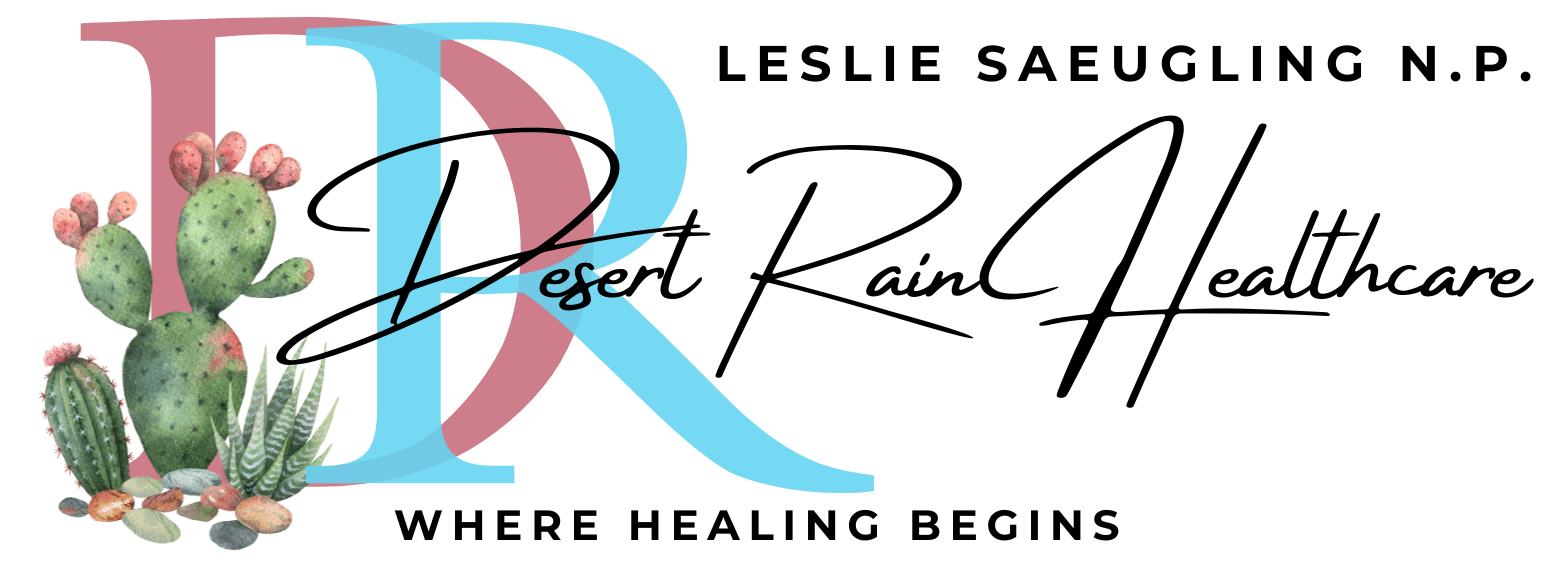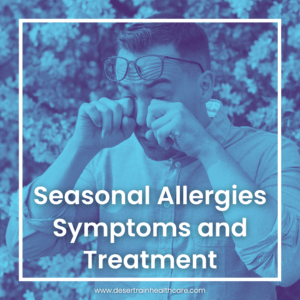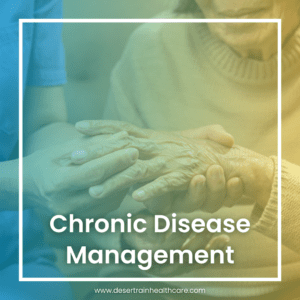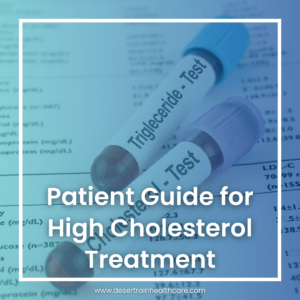High blood pressure, also known as hypertension, is often referred to as the “silent killer” because it typically has no symptoms but can lead to serious health problems such as heart disease, stroke, and kidney failure. Understanding the risk factors associated with high blood pressure is crucial for prevention, early detection, and effective management. At Desert Rain Healthcare in Glendale, Arizona, Nurse Practitioner Leslie Saeugling and her dedicated team offer comprehensive care to help you manage your blood pressure and reduce your risk of complications.
What Is High Blood Pressure?
Blood pressure is the force of blood pushing against the walls of your arteries as your heart pumps blood. When this pressure remains consistently high, it is known as hypertension. Over time, high blood pressure can damage your arteries and lead to severe health issues.
Blood pressure is measured in millimeters of mercury (mm Hg) and recorded as two numbers:
- Systolic Pressure: The top number, which measures the pressure in your arteries when your heart beats.
- Diastolic Pressure: The bottom number, which measures the pressure in your arteries between heartbeats.
Normal blood pressure is usually considered to be around 120/80 mm Hg. Hypertension is generally diagnosed when blood pressure readings consistently exceed 130/80 mm Hg.
Risk Factors for High Blood Pressure
Several factors can increase your risk of developing high blood pressure. Some of these factors are within your control, while others are not. Understanding these risk factors can help you take proactive steps to protect your health.
1. Age
As you age, your risk of developing high blood pressure increases. Blood vessels naturally become stiffer over time, which can cause blood pressure to rise. Hypertension is more common in people over the age of 60, but it can affect younger individuals as well.
2. Family History
Genetics play a significant role in determining your risk for high blood pressure. If you have a close family member, such as a parent or sibling, with hypertension, your chances of developing the condition are higher. It is essential to monitor your blood pressure regularly if you have a family history of hypertension.
3. Gender
Gender can influence your risk of developing high blood pressure. Until about age 64, men are more likely than women to have high blood pressure. However, after age 65, women are more likely than men to develop hypertension.
4. Ethnicity
High blood pressure is more common in certain ethnic groups. For example, African Americans tend to develop hypertension at an earlier age and have higher blood pressure levels than Caucasians and Hispanics. They also have a higher risk of developing severe complications such as stroke and kidney disease.
5. Weight and Obesity
Being overweight or obese is a significant risk factor for high blood pressure. The more you weigh, the more blood is needed to supply oxygen and nutrients to your tissues. As the volume of blood circulating through your blood vessels increases, so does the pressure on your artery walls.
6. Physical Inactivity
A sedentary lifestyle contributes to a higher risk of hypertension. Lack of physical activity can lead to weight gain and increase the chances of developing high blood pressure. Regular exercise helps to strengthen your heart, lower blood pressure, and reduce your overall cardiovascular risk.
7. Unhealthy Diet
A diet high in sodium, saturated fats, and processed foods can significantly increase your risk of high blood pressure. Sodium, in particular, causes your body to retain water, which can raise blood pressure. Conversely, a diet rich in fruits, vegetables, whole grains, and lean proteins can help manage and prevent hypertension.
8. Alcohol Consumption
Excessive alcohol consumption can raise your blood pressure. Drinking more than one drink per day for women and more than two drinks per day for men can lead to hypertension. Limiting alcohol intake is crucial for maintaining healthy blood pressure levels.
9. Tobacco Use
Smoking and using other forms of tobacco can raise your blood pressure and damage the lining of your artery walls. The chemicals in tobacco can narrow your arteries, making it more difficult for blood to flow and increasing the risk of hypertension.
10. Stress
Chronic stress may contribute to high blood pressure. When you’re stressed, your body produces hormones that temporarily increase blood pressure by causing your heart to beat faster and your blood vessels to narrow. Over time, repeated stress-related blood pressure spikes can lead to hypertension.
11. Chronic Conditions
Certain chronic conditions, such as diabetes, kidney disease, and sleep apnea, can increase your risk of developing high blood pressure. Managing these conditions effectively is essential for controlling blood pressure and reducing the risk of complications.
12. Lack of Sleep
Poor sleep patterns, including getting fewer than six hours of sleep each night, can contribute to high blood pressure. Sleep is essential for maintaining overall health, and inadequate rest can lead to long-term health issues, including hypertension.
Preventing and Managing High Blood Pressure
While some risk factors for high blood pressure are beyond your control, there are several steps you can take to reduce your risk and manage your blood pressure effectively.
1. Adopt a Healthy Diet
Focus on a heart-healthy diet that includes plenty of fruits, vegetables, whole grains, and lean proteins. Reduce your intake of sodium by avoiding processed and fast foods. Incorporate potassium-rich foods, such as bananas, spinach, and sweet potatoes, which can help balance sodium levels and lower blood pressure.
2. Exercise Regularly
Engage in regular physical activity, such as brisk walking, swimming, or cycling, for at least 30 minutes most days of the week. Exercise helps to strengthen your heart, improve blood circulation, and lower your blood pressure.
3. Maintain a Healthy Weight
Achieving and maintaining a healthy weight is crucial for controlling blood pressure. If you’re overweight, losing even a small amount of weight can significantly impact your blood pressure.
4. Limit Alcohol and Quit Smoking
If you drink alcohol, do so in moderation. Quitting smoking is one of the best things you can do for your overall health and can help lower your blood pressure.
5. Manage Stress
Practice stress-reducing techniques such as deep breathing, meditation, yoga, or spending time in nature. Managing stress effectively can help prevent blood pressure spikes and improve your overall well-being.
6. Get Enough Sleep
Aim for 7-8 hours of quality sleep each night. Establish a regular sleep routine, create a relaxing bedtime environment, and avoid caffeine and electronics before bed.
7. Monitor Your Blood Pressure
Regular blood pressure checks are essential, especially if you have risk factors for hypertension. Monitoring your blood pressure at home and attending regular check-ups with your healthcare provider can help detect and manage high blood pressure early.
Desert Rain Healthcare: Comprehensive Care for High Blood Pressure
At Desert Rain Healthcare in Glendale, Arizona, we understand the importance of managing high blood pressure to prevent serious health complications. Nurse Practitioner Leslie Saeugling and her experienced team are committed to providing personalized care to help you achieve and maintain healthy blood pressure levels.
Desert Rain Healthcare offers both in-person and virtual telehealth appointments, making it convenient for you to receive care from the comfort of your home. Our services include diagnosing, treating, and prescribing medications tailored to your needs, ensuring you receive comprehensive care.
Located at 5721 W. Bell Rd, Suite 21, Glendale, AZ 85308, Desert Rain Healthcare is currently accepting new patients. To schedule an appointment, please call our clinic at (623) 432-4263. We are here to help you take control of your blood pressure and improve your overall health.
Conclusion
High blood pressure is a common yet manageable condition that requires a proactive approach. By understanding the risk factors and making healthy lifestyle choices, you can reduce your risk of hypertension and protect your heart health. If you have concerns about your blood pressure, don’t hesitate to seek medical care. Desert Rain Healthcare is here to support you every step of the way, offering comprehensive treatment options to help you live a healthier, longer life.








